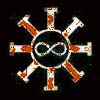| 
Avatara draw their thematic influences
from Savitri Devi, the first person to recognize, and
explicate, the kozmic nature of a national based socialism.
Devi, although born in France, developed a profound interest
and knowledge of Hindu kozmology, and recognized the connection
between Hinduism and the Germanic cultures of Europe.
In her work, Devi wrote that: “Well did von Sebottendorff,
founder of the famous Thule Society, owe a lot to his
visits to India and his Contact/Orders with the Hindus conscious
of their Hyperborean traditions.”
In her magnum opus, The Lightning
and the Sun, Devi’s kozmological ideas acquired
their most succinct expression. She considered history
as cyclic, and embodied within certain figures who represent
deities from Hindu kozmology. The god Vishnu was manifested
in the Egyptian pharaoh Akhenaton, the man above time
who is symbolised the sun. Shiva was embodied in Genghis
Khan, the man in time, symbolised by lightning. While
Kalki (the tenth avatar of Vishnu) will become manifest
in the man against time -who lives in eternity, while
acting in time- and who combines both the lightning and
the sun. Devi saw Adolf Hitler, not as Kalki himself,
but as an avatar of the avatar, one who prepares the way
for his coming. For as Hitler himself stated: “I
am not he; but while nobody comes forward to prepare the
way for him, I do so.” Kalki will appear at the
conclusion of, and to complete, the current age of Kali
Yuga. He will manifest as a warrior on a white horse;
in southern India, he is believed to be the horse itself),
bearing an immense sword: "To diminish the burden
of the earth, the unborn Lord will take birth in the Yadu
dynasty and perform feats impossible even for the demigods.
Propounding speculative philosophy, the Lord, as Buddha,
will bewilder the unworthy performers of Vedic sacrifices.
And as Kalki, the Lord will kill all the low-class men
posing as rulers at the end of the age of Kali."
The figure of Kalki was interpolated into the biblical
book of Revelation also; a book which relates a gnostic
visionary experience, rather than a Judaeo-Christian prophesy.
In Revelation 6:6, the saint writes: "And I looked,
and behold a pale horse: and his name that sat on him
was Death, and Hell followed with him.”
Musically, Avatara combines contemporary
dark ambient and western industrial elements with classical
ragas, and other Indian instrumental forms. Musical reference
is also made to the Japanese writer Yukio Mishima, with
the influence of the sparse Japanese Zen flute form of
composition. Avatara's kozmic work, The Lightning and
the Sun, was originally released on cassette, but
has now been repressed on cdr, with two additional tracks.
For an article on an extension of the
archetypal model of the Lightning and the Sun, click here

|


![]()
![]()
![]()
![]()
![]()
![]()